Average sizes and life expectancy for this breed:
Papillons are named after the French word for butterfly, and it's easy to see why with their large, flared ears and dainty appearance. Also known as small Spaniel dogs, these canines have frequently been depicted in royal paintings throughout history. Their appearance has changed slightly since they first appeared in the 1500s. But they are still the same delightful canine companions who graced the laps of kings, ladies, and other noble people so many years ago.
Papillons became one of the most popular breeds in French dog shows at the turn of the 20th century. They also achieved the same reputation in the United Kingdom and the U.S. The earlier Papillon show dogs were larger compared to their modern counterparts. However, by using selective breeding, a smaller and more radiantly-coloured dog with white patches, called Blaze, was produced. Today, their butterfly appearance is boosted with a white blaze down the centre of their face and nose, and a proportionally shaded face and ears.
Papillons have effortlessly upheld their status as popular family companions over the years, thanks to their outstanding performances in the show ring, high intelligence, and adoration for human companionship. In fact, they rank number 8 out of 79 dog breeds for intelligence.
Aside from being extremely intelligent, Papillons are happy and lively. They have often been described as large dogs with small bodies. They are also outgoing but generally show no signs of aggressiveness. Papillons make great companions because they love long walks, but they are also just as content curling up with their human companion on the sofa. These attentive dogs are eager to please, so they are relatively easy to train.
See available puppies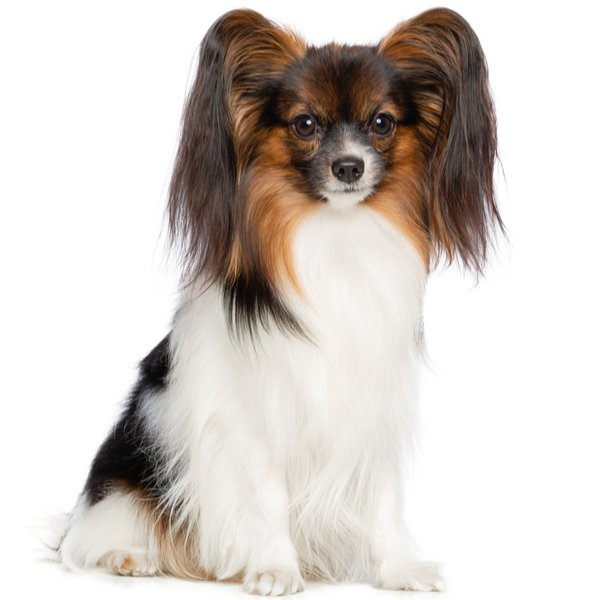

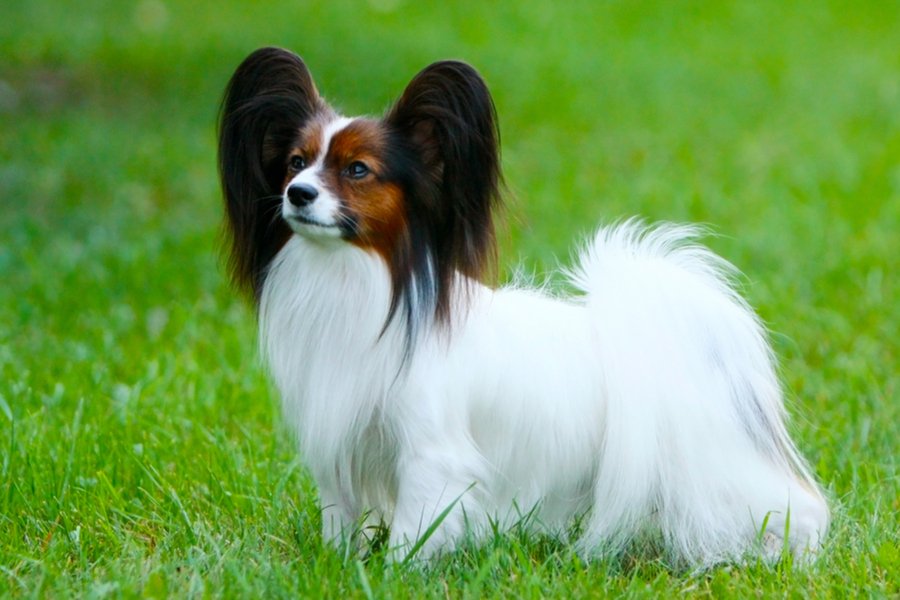


Papillon dogs are a descendant of a European Toy Spaniel. These Spaniel dogs appeared in the royal court’s paintings of Europe dating back to the early 16th century. Tiziano Vecelli, one of the best-known court painters, included several tiny Spaniel dogs in his paintings from 1500. These dogs were believed to be Titian Spaniels that are now extinct.
Over the Renaissance period, most Toy Spaniel dogs had drooping ears. The erect butterfly-like ears that the Papillon is known for, didn’t appear until the end of the 19th Century. However, they quickly shot to fame and the name Papillion became widespread. Over the years, many attempts have been made to decipher the names and origins of the two varieties but with no success. Today, Papillion’s come in both erect-eared and drooping-eared (Phalene) types.
Papillon dogs and their ancestors were the favourites among European Royal families. However, today, these adorable, lively dogs are popular canine companions for families around the world.
This dog breed was first recognised by the American Kennel Club in 1915. The UK Papillon (Butterfly Dog) Club was established in 1923. In 1999, a Papillon dog named Ch. Loteki Supernatural Being (Kirby) won the respected Westminster Kennel Club Dog Show.
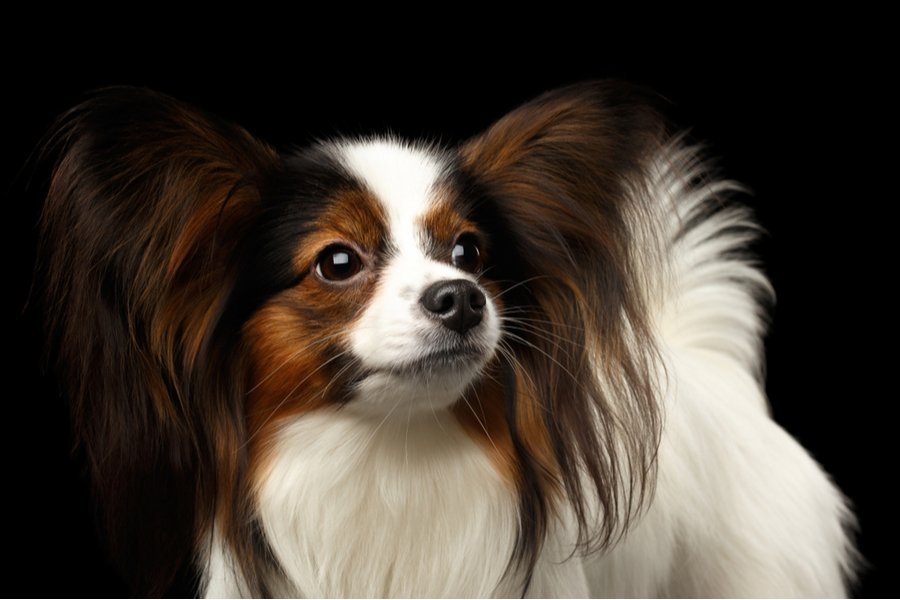
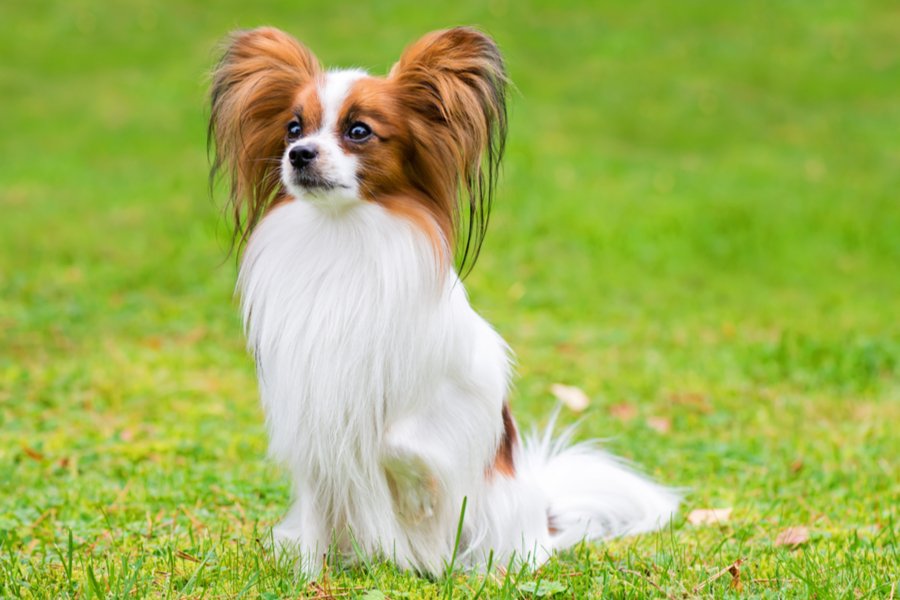
These dainty little dogs have alert and intelligent looks on their faces. Papillons have slightly rounded heads with neatly pointed muzzles that are a lot finer and more prominent than their skulls. They have very well-defined stops, and their black noses stand out beautifully against their vibrant coat colours. Their medium-sized eyes are well-rounded and dark in colour with dark rims.
Their large ears are very mobile, rounded at the tips, and solidly fringed. They are set towards the back of the head, wide enough apart not to hide their slightly rounded head. They have strong jaws with a perfect scissor bite. Their lips are thin, tight, and dark in colour.
Papillons have sloping shoulders, deep chests, and straight front legs that are fine-boned. Their bodies are fairly long with well-sprung ribs and arched abdomens. Their paws are fine with long tufts of hair between the toes that extend much further than the paws themselves. These dogs have long, well-feathered tails that are set high and carried arched over their backs. The impressive, bushy fringe of the tail falls to one side, forming a plume.
Papillons are single-coated dogs with no undercoat. Their fur is long, fine, and very silky. It sits flat against the back but forms a generous frill on the chest. Their tails, thighs, and the back of their front legs are covered with much longer hair. These dogs have a white coat base with patches of colour that can include:
Tri-colour Papillons have black patches with tan spots over their eyes, on their cheeks, inside their ears, and under the root of the tail.
Papillons are cheerful, active, and sociable dogs, rarely ever shy or aggressive. This breed is a ‘take-charge’ dog with a moderate to intense activity level. They are brilliant and highly trainable. Papillons are best described as a doer, not a cuddler.
These beautiful dogs are typically outgoing, happy little dogs that adore sitting on their owners' laps just as much as they love being active around the house. While they are energetic and spirited, they are not considered tense, anxious, or fearful. They do not bark excessively but they are quick to alert you to unfamiliar sights and sounds.
Papillons generally enjoy socializing with dog-friendly cats and with other dogs. They will also eagerly take on larger animals during play. These dogs adore playing with children, but you need to teach your kids to be gentle with these rambunctious dogs to avoid injury.
A Papillon’s attentiveness, intelligence, and strong desire to please have made them a favourite in obedience competitions. They are also known to have outstanding talents in agility, and tracking, and make excellent therapy dogs.
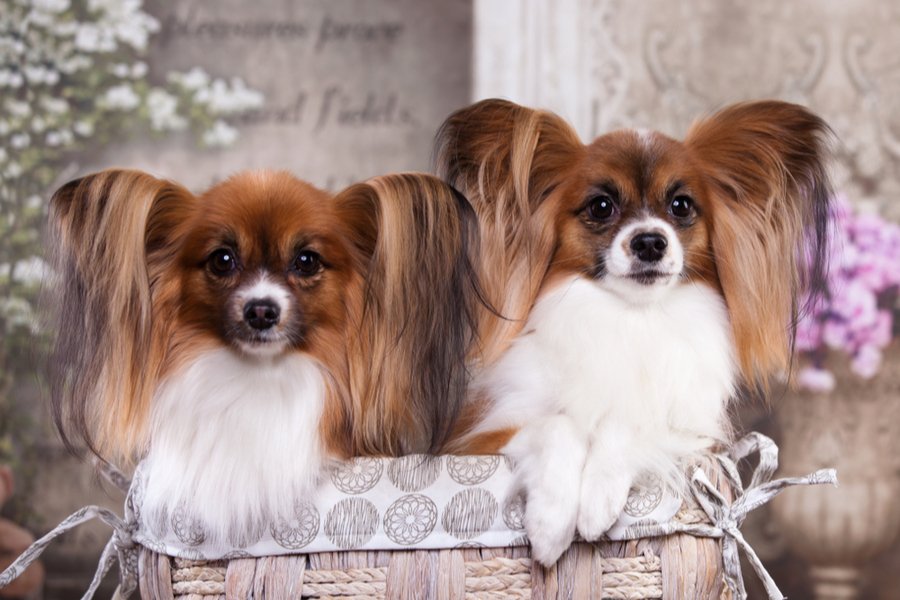
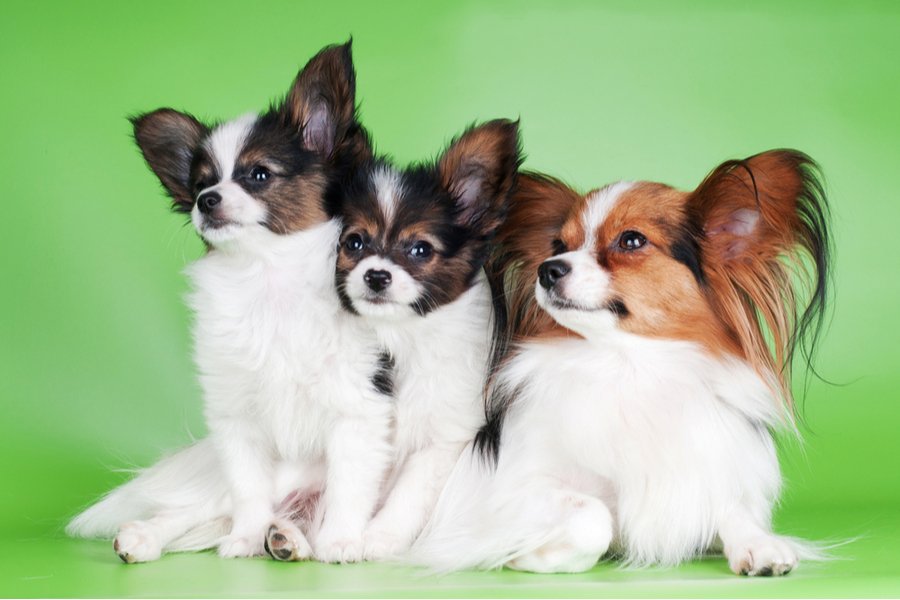
Papillons are highly trainable, so they are an excellent choice for you if you plan to participate in canine sports, such as rallies or agility courses. Papillons are also exceptional competitors in the obedience ring and the number-one toy dog breed in obedience competitions.
All Papillon dog owners must attend obedience classes to ensure that they do not spoil their adorable canine companions. This dog breed can develop a stubborn streak if not trained consistently from puppyhood.
On a positive note, they have the will to please their human companions and their innate desire to win makes them great at learning tricks.
Papillons have long, silky hair. However, surprisingly, they are low maintenance on the grooming front because of the lack of an undercoat. A good brush once a week is sufficient for these dogs. During grooming, you will need to pay particular attention to the long hair inside their hind legs and behind their ears. Use a comb or soft slicker brush on these areas to prevent matting and tangles. These dogs also require a bath every few months or whenever they get overly dirty.
During grooming, it's a good idea to check them over for any signs of infection, such as irritation, itchiness, tenderness, inflammation, swelling, or any abnormal lumps. Particularly around the eyes, nose, and ears. A Papillon’s eyes must be clear, without discharge or redness. Consistently examining your dog will aid you in keeping track of their health and avoid future health problems.
Clean their ears weekly with a vet-approved ear cleaner. If your Papillon often scratches at their ears or shakes their head, contact your vet for an ear checkup. Ear infections that are left to fester can become much harder to treat.
Brush your Papillon's teeth at least two or three times a week to remove bacteria and tartar buildup. Daily dental hygiene is still the best option to keep your Papillon’s mouth healthy.
Trim your Papillon’s nails once or twice a month or as needed. Long nails can lead to a whole host of issues that can be painful for your dog.
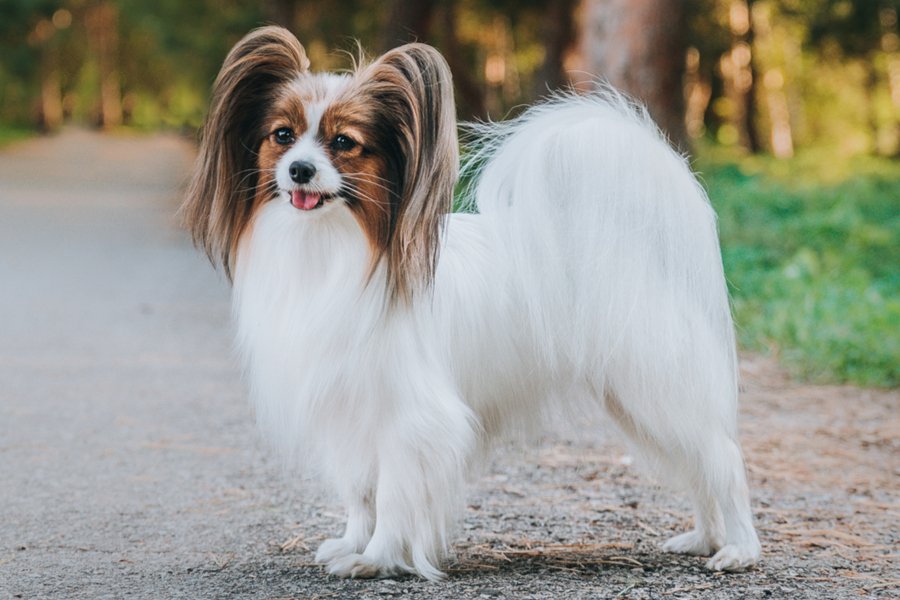
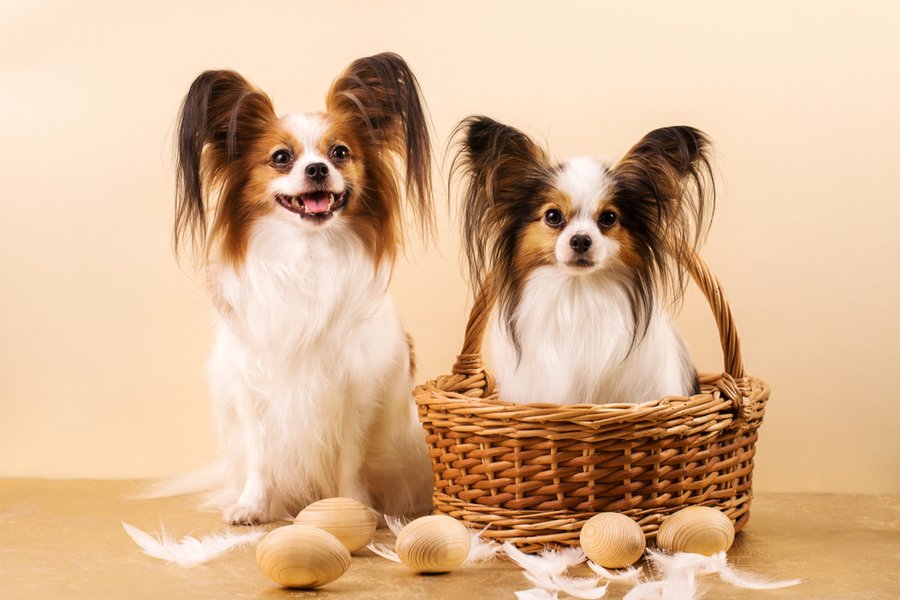
Despite their tiny size, Papillons are known to be robust and courageous. However, it’s still a good idea to be gentle with these dogs, especially when they are still puppies, because of their fine bone structure. When purchasing a Papillon puppy, always make sure you only buy from a reputable and licensed breeder. They will be able to run DNA tests to determine if there are any underlying health issues that you need to be aware of.
A Papillon’s life expectancy is 14-16 years with proper care, exercise, and a high-quality diet. However, like all dog breeds, Papillons may experience certain health conditions such as:
If introduced during puppyhood, Papillons can get along well with other household pets, including cats. The courageous Papillon will usually boss around a bigger dog. In some households, this may or may not cause problems.
Papillons adore children. However, an adult should be watchful when a young child interacts with a Papillon. These dogs can easily jump out of a kid’s hands and injure themself if they are not being held correctly. They will also not hesitate to protect themself if they are being mistreated.
It’s common for this dog breed to live well into their senior years. So, if you are planning to purchase one, you should take into consideration that your dog will be a part of your family for many years to come.
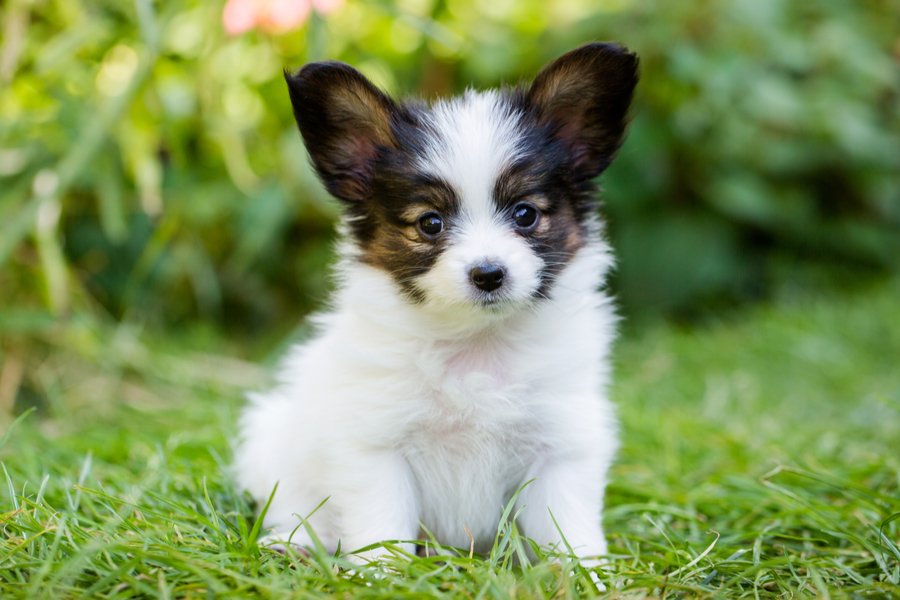
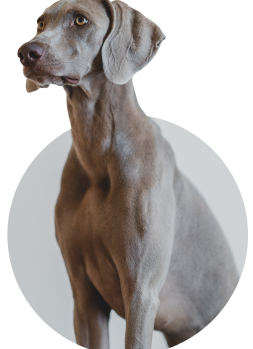
We can connect you with Breeders that are specialized in this particular breed.
See available puppies
Mexico
Size : Small
Coat : Long
Registration : KC, FCI, AKC
Exercise : 30 minutes
Training : Easy
Grooming : Twice a Week

United Kingdom
Size : Small
Coat : Long
Registration : KC, FCI, AKC
Exercise : 1 hour
Training : Easy
Grooming : Twice a Week
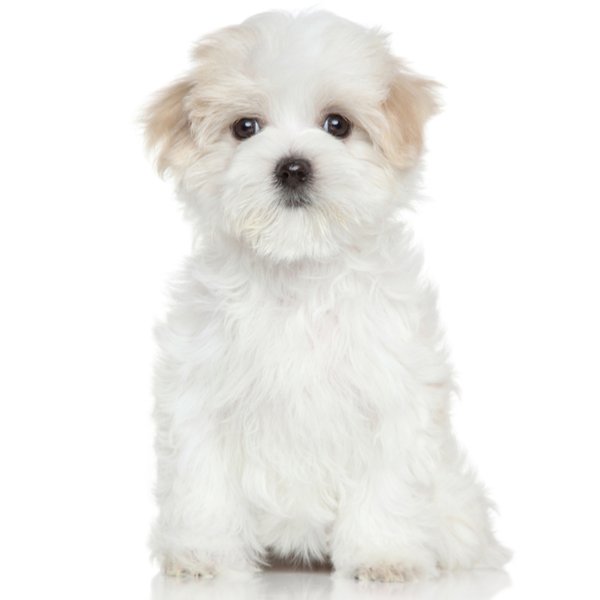
Malta
Size : Small
Coat : Long
Registration : KC, FCI, AKC
Exercise : 30 minutes
Training : Medium
Grooming : Twice a Week
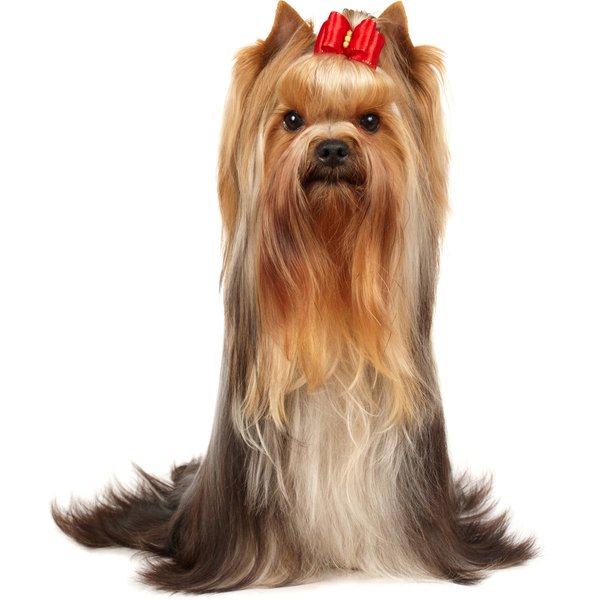
United Kingdom
Size : Small
Coat : Long
Registration : KC, FCI, AKC
Exercise : 30 minutes
Training : Easy
Grooming : Twice a Week


Need some advice?
Whether you're a first time pet owner, an experienced pet owner, a new or long-time breeder, or just curious about pets, we've got you covered!
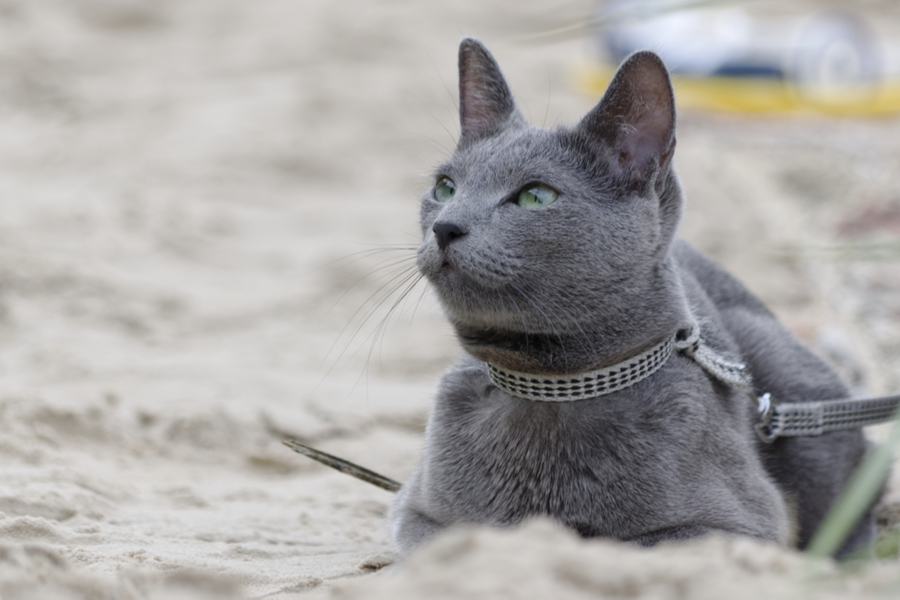
January 17, 2024
What Is The Personality Of Russian Blue Cats?
Russian Blue cats are most known for their distinctive shimmery blue-silver coat and piercing green eyes. However, this breed’s calm and gentle temperament is what makes them shine the most in the feline world.
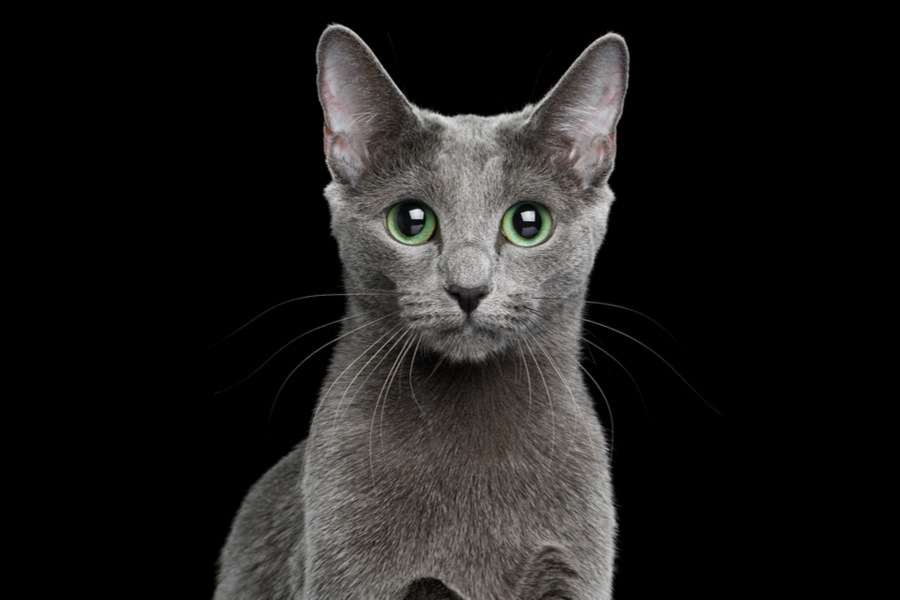
January 17, 2024
10 Facts About Russian Blue Cat Breed
Russian Blues are one of the most aesthetically stunning cat breeds, with a gorgeous plush silvery coat and vibrant green eyes. However, it’s not only their appearance that is beautiful; their nature is too.
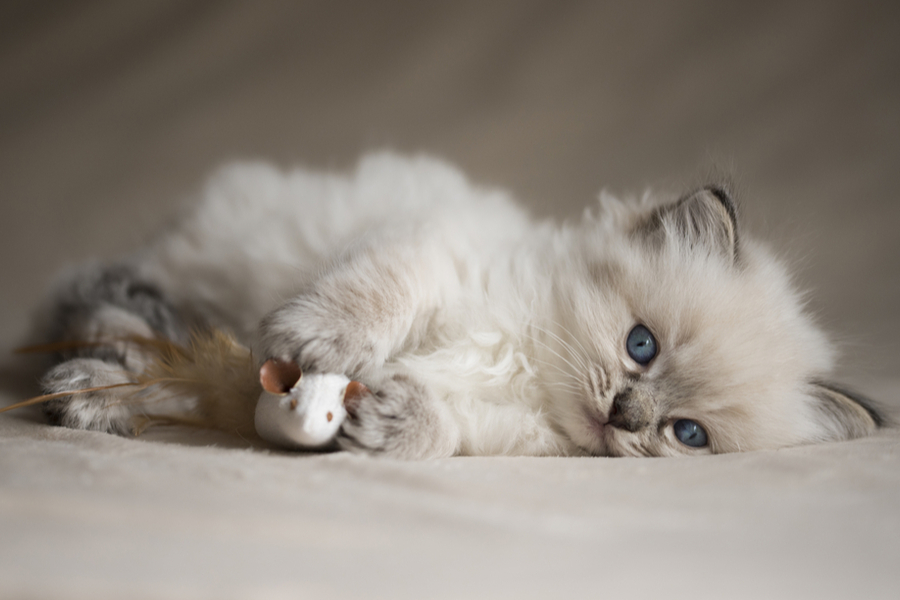
January 17, 2024
How To Choose The Right Cat Breed for You
Cats can make the most fantastic animal companions; they are adorable, friendly, and loving. However, not all felines are created equal. There are many different breeds, of which each has its unique personality traits.
Need some help?
Contact us to speak to our friendly advisor, who will gladly help you find your dream pet!



We are registered in England and Wales under registration number 12568840,
and our registered office is at 58-60 Kensington Church Street, W8 4DB London, England.
© 2023 The Pedigree Paws